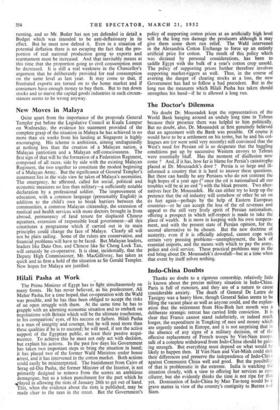New Moves in Malaya
Quite apart from the importance of the proposals General Templer put before the Legislative Council at Kuala Lumpur on Wednesday, the evidence his statement provided of the complete grasp of the situation in Malaya he has achieved in no more than six weeks from his landing at Singapore is highly encouraging. His scheme is ambitious, aiming undisguisedly at nothing less than the creation of a Malayan nation, a Malayan patriotism and a Malayan self-consciousness. The first sign of that will be the formation of a Federation Regiment, composed of all races, side by side with the existing Malayan Regiment, the two together to constitute the modest beginning of a Malayan Army. But the significance of General Templer's statement lies in the wide view he takes of Malaya's necessities. The emergency, he affirmed, called for social, political and economic measures no less than military—a sufficiently notable declaration by a professional soldier. The improvement of education, with a common language (presumably English) in addition to the child's own to break barriers between the communities, a common Malayan citizenship, the extension of medical and health services with more doctors brought in from abroad, permanency of land tenure for displaced Chinese squatters, extension of responsible local government—all this constitutes a programme which if carried out in its main Principles could change the face of Malaya. Clearly all will not be plain sailing. Some of the rulers are conservative, and financial problems will have to be faced. But Malayan leaders, leaders like Dato Onn, and Chinese like Sir Cheng Lock Tan, will certainly be co-operative. It is clear, incidentally, that the Deputy High Commissioner, Mr. MacGillivray, has taken as quick and as firm a hold of the situation as Sir Gerald Templer. New hopes for Malaya are justified.


































 Previous page
Previous page